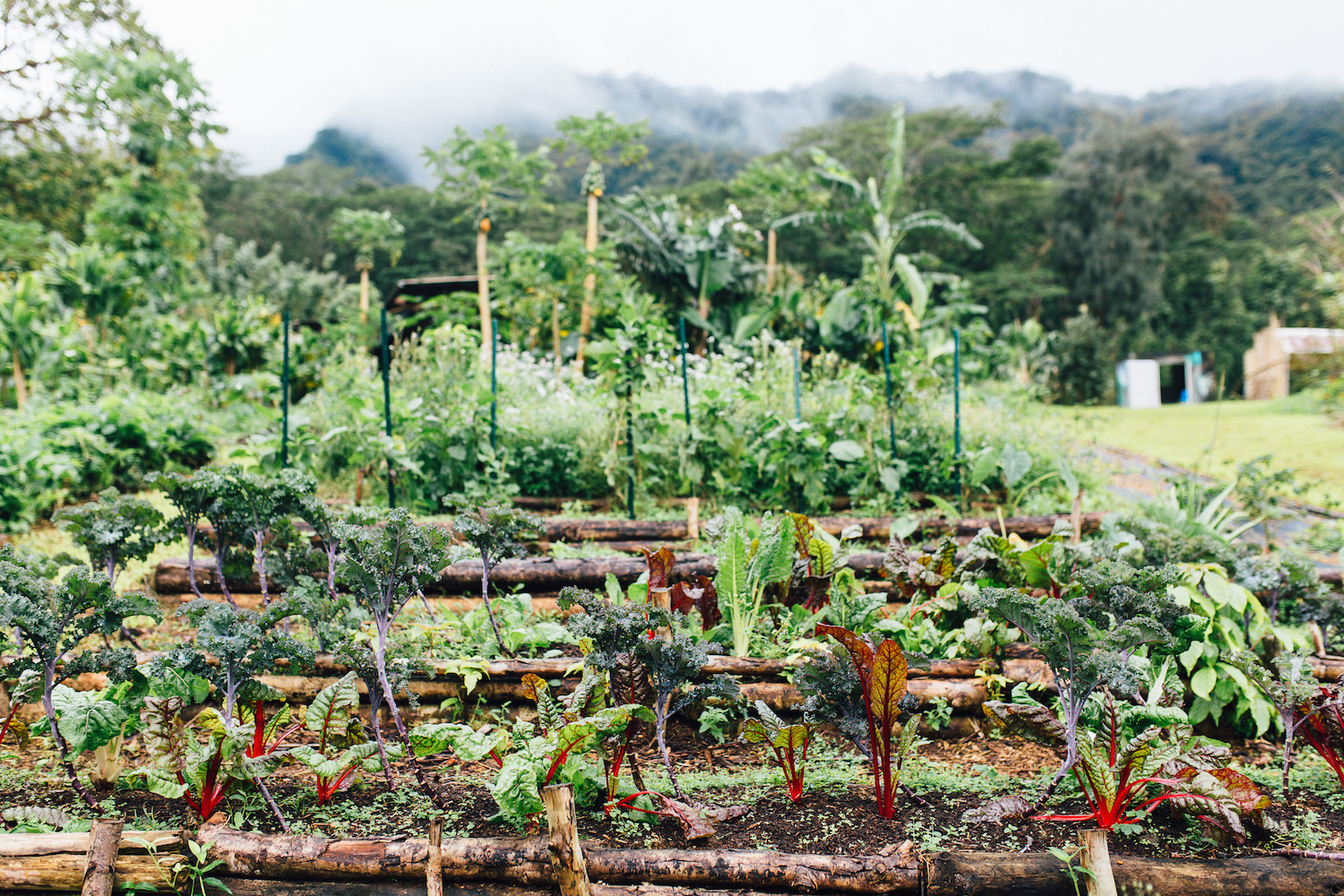The Roots Project cooks up a hearty food system in Kalihi.
It’s Thursday at Roots Cafe, one of only two days a week the eatery is open, and it is bustling with activity. Diners greet cooks and workers by name, while groups of friends talk story, discuss work over lunch, or share food. It’s an unadorned, humble little thing, consisting of a few dining tables and a lunch counter tucked away at the far back of the Kōkua Kalihi Valley Community Health Center, on the far end of School Street. But it’s got big flavor.
This day, the dishes listed on the café’s chalkboard include a barbecue portobello mushroom burger, chickpea curry, and pineapple kombucha. There is a hefty inclusion of ingredients from local farms, which are noted alongside the dish. It is a far cry from the menu of a typical grab-and-go plate-lunch restaurant.

In fact, Roots Kalihi, the organization behind the café, aims to change what its neighborhood considers standard fare. The organization began under Kōkua Kalihi Valley in 2011 with one grant and a vision to bring health back into Kalihi through food.
Six years later, it is juggling six grants and a plateful of projects: the café, farmers markets, nutrition education outreach, cooking classes, cultural food events, community gardens, and a program discounting produce for food stamp holders.
The café, which opened in 2013, is a snapshot of Roots Kalihi’s endeavor to reshape the neighborhood’s food systems, from production to distribution to demand, and in body as well as in spirit. Its founders knew that native health couldn’t be truly understood solely through modern, clinical metrics like body mass index or blood pressure. For a roadmap on where to start, they turned to the community itself.
“We really wanted to sit down and ask, ʻWhat does health look like if you’re looking at wellness through indigenous eyes?’” says program director Sharon Ka‘iulani Odom. “Knowing that food connects you to all of your family, your customs, are we taking the time nowadays to share food with neighbors, to share stories with neighbors, to connect?”
The team embarked upon a year of research. They held dinners to which they invited cultural practitioners, thinkers, and community members. They asked each other how they defined good health and when they felt healthiest. The responses weren’t about numbers on a scale, weights lifted, or miles ran. Instead, they were about times when food provided key connections—to places, better selves, others, the past, and the future. Now, with each program, Odom and her team ask themselves how they can help people better connect in these ways.

Informing all programs, always, is a cultural foundation that values the power of shared and ancestral knowledge and experiences. Special attention is paid to reviving and nurturing the food varieties and traditions of the past that once bound people together, enhanced their sense of place, and connected them to the foods on their plates.
“We want kids to know how to do an imu when they grow up, be able to be in charge and know all the steps,” Odom says. “We teach them how to lay net and how to make squid. We’ve even done haupia from scratch, where they have to get the coconut and grate the coconuts and squeeze it. It’s a family health project, but it’s based around food and taking care of the ‘āina.”
Roots is also improving access to resources. In 2013, the team launched a farmers market at the Towers at Kūhio Park, an affordable housing community. The idea was to give residents who might otherwise find it easier to reach for cheaper processed or fast-food options access to affordable, fresh, organic produce.
In 2015, Roots Kalihi also launched a mobile produce cart that makes rounds at the health center and throughout the neighborhood, stopping at schools and workplaces. They provided access to ancestral foods such as poi and breadfruit. To bring it full circle, the nonprofit also offers nutrition awareness and cooking classes.
As families in the neighborhood get the knowledge they need to prepare wholesome meals, local farmers are finding growing customer support at the markets and health center, and Roots Kalihi’s community gardens are thriving. The cultural food knowledge of yore is being revived.
It is busy but rewarding work for Roots Kalihi’s staff of about 15, each of whom contribute their own food-related passions and backgrounds in topics that include farming, nutrition, anthropology, social work, baking, and beer brewing.

Back at the café, employees and volunteers munch on rose and cardamom cookies, homemade by their operations manager, while they stuff gift baskets filled with local fruits, vegetables, and treats for helpers in the back office. Earlier that morning, the group had come together at sister property Ho‘oulu ‘Āina, a farm and cultural space deep in the valley, for a time of togetherness and meditation.
As the early sun began its crest over the Ko‘olau mountains, the Roots ‘ohana recited an oli, or chant, over the space’s four ahu, or shrines. Each individual set his or her personal intention for the coming months, and discussed their gratitude for this ‘āina, these people, and this work.
“We’re doing the best we can for Kalihi, but there are also things we’re getting from working here that’s helping us as individuals to grow,” Odom says. “From a Western point of view, it’s always about getting bigger and better—and that’s not my goal at all. My goal is to make sure that everyone is taken care of.”
Roots Kalihi is doing just that, from body to soul, one plate of food at a time.
Roots Cafe is located in the Kokua Kalihi Valley Wellness Center, 2229 North School St.
For more information, visit rootskalihi.com

